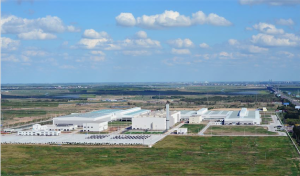
Volvo Cars has become the first automaker in the world to export China-built cars to Europe by train via China’s new ‘One Belt, One Road’ trade initiative.
The first S90 premium sedans, built at Volvo’s Daqing plant in China, arrived at a distribution centre in Zeebrugge, Belgium, last week.
The cars have been transported to Belgium via the recently opened China-Europe railway link. The connection brings down the time it takes to transport vehicles to Europe by two-thirds compared with the naval route, meaning customers receive their cars faster after placing their orders.
The train route ties Volvo’s global manufacturing and logistics strategy to the multi-billion euro trade flows between China and Europe and the so-called One Belt, One Road initiative that seeks to resurrect the age-old Silk Road trade route for a new era of global trade.
The railway link also illustrates how China is turning into a global manufacturing and export hub for high-end consumer products.
Volvo was the first Western car maker to export a premium China-made car to the US in 2015 with the S60 Inscription. In November of 2016, Volvo started building high-end versions of its S90 premium sedan in Daqing for global exports, and will soon be building all S90 vehicles in the factory for global export.
Beyond shorter waiting times for customers, rail is also a smarter choice in terms of the environmental impact of logistics operations. Given the same distance over water, the CO2 emissions per tonne/km are reduced by a third by choosing rail over sea transport. In this case, the savings will be even higher based on the shorter distance.
Each of the Volvo-dedicated trains traveling between Daqing and Zeebrugge carries around 225 Volvo cars, which are transported in specially designed containers.
One container holds three cars at different angles in order to maximise the use of space available inside. Special fixtures ensure that the cars are fastened during transport and do not move.
Initially, trains will depart from Daqing once a week. The plan is to increase this frequency in line with growing volumes.
The first S90 sedans arrived in Zeebrugge on 31 May, the same week as China’s Prime Minister Li Keqiang visited Belgium. In connection with his visit in the country, Li Keqiang was also scheduled to meet with Volvo Cars’ chairman Li Shufu and CEO Håkan Samuelsson.
South Africa is due to start receiving China-built S90 models in the latter half of 2017, with these vehicles coming directly from China.
 ..:: AUTO REPORT AFRICA ::..
..:: AUTO REPORT AFRICA ::..




